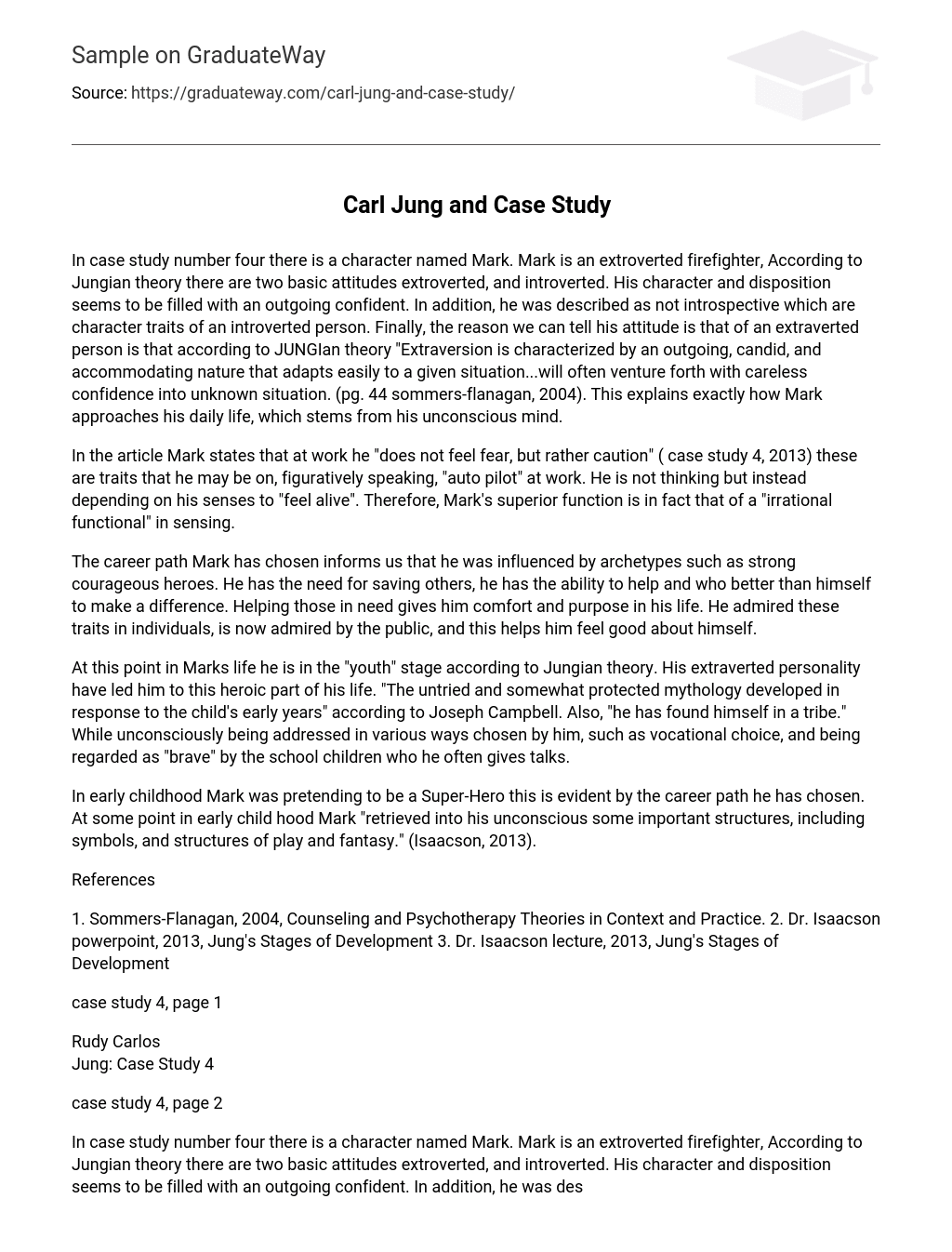In case study number four there is a character named Mark. Mark is an extroverted firefighter, According to Jungian theory there are two basic attitudes extroverted, and introverted. His character and disposition seems to be filled with an outgoing confident. In addition, he was described as not introspective which are character traits of an introverted person. Finally, the reason we can tell his attitude is that of an extraverted person is that according to JUNGIan theory “Extraversion is characterized by an outgoing, candid, and accommodating nature that adapts easily to a given situation…will often venture forth with careless confidence into unknown situation. (pg. 44 sommers-flanagan, 2004). This explains exactly how Mark approaches his daily life, which stems from his unconscious mind.
In the article Mark states that at work he “does not feel fear, but rather caution” ( case study 4, 2013) these are traits that he may be on, figuratively speaking, “auto pilot” at work. He is not thinking but instead depending on his senses to “feel alive”. Therefore, Mark’s superior function is in fact that of a “irrational functional” in sensing.
The career path Mark has chosen informs us that he was influenced by archetypes such as strong courageous heroes. He has the need for saving others, he has the ability to help and who better than himself to make a difference. Helping those in need gives him comfort and purpose in his life. He admired these traits in individuals, is now admired by the public, and this helps him feel good about himself.
At this point in Marks life he is in the “youth” stage according to Jungian theory. His extraverted personality have led him to this heroic part of his life. “The untried and somewhat protected mythology developed in response to the child’s early years” according to Joseph Campbell. Also, “he has found himself in a tribe.” While unconsciously being addressed in various ways chosen by him, such as vocational choice, and being regarded as “brave” by the school children who he often gives talks.
In early childhood Mark was pretending to be a Super-Hero this is evident by the career path he has chosen. At some point in early child hood Mark “retrieved into his unconscious some important structures, including symbols, and structures of play and fantasy.” (Isaacson, 2013).
References
1. Sommers-Flanagan, 2004, Counseling and Psychotherapy Theories in Context and Practice. 2. Dr. Isaacson powerpoint, 2013, Jung’s Stages of Development 3. Dr. Isaacson lecture, 2013, Jung’s Stages of Development
case study 4, page 1
Rudy Carlos
Jung: Case Study 4
case study 4, page 2
In case study number four there is a character named Mark. Mark is an extroverted firefighter, According to Jungian theory there are two basic attitudes extroverted, and introverted. His character and disposition seems to be filled with an outgoing confident. In addition, he was described as not introspective which are character traits of an introverted person. Finally, the reason we can tell his attitude is that of an extraverted person is that according to JUNGIan theory “Extraversion is characterized by an outgoing, candid, and accommodating nature that adapts easily to a given situation…will often venture forth with careless confidence into unknown situation. (pg. 44 sommers-flanagan, 2004). This explains exactly how Mark approaches his daily life, which stems from his unconscious mind.
In the article Mark states that at work he “does not feel fear, but rather caution” ( case study 4, 2013) these are traits that he may be on, figuratively speaking, “auto pilot” at work. He is not thinking but instead depending on his senses to “feel alive”. Therefore, Mark’s superior function is in fact that of a “irrational functional” in sensing.
The career path Mark has chosen informs us that he was influenced by archetypes such as strong courageous heroes. He has the need for saving others, he has the ability to help and who better than himself to make a difference. Helping those in need gives him comfort and purpose in his life. He admired these traits in individuals, is now admired by the public, and this helps him feel good about himself.
At this point in Marks life he is in the “youth” stage according to Jungian theory. His extraverted personality have led him to this heroic part of his life. “The untried and somewhat protected mythology developed in response to the child’s early years” according to Joseph Campbell. Also, “he has found himself in a tribe.” While unconsciously being addressed in various ways chosen by him, such as vocational choice, and being regarded as “brave” by the school children who he often gives talks.
In early childhood Mark was pretending to be a Super-Hero this is evident by the career path he has chosen. At some point in early child hood Mark “retrieved into his unconscious some important structures, including symbols, and structures of play and fantasy.” (Isaacson, 2013).
References
1. Sommers-Flanagan, 2004, Counseling and Psychotherapy Theories in Context and Practice. 2. Dr. Isaacson powerpoint, 2013, Jung’s Stages of Development 3. Dr. Isaacson lecture, 2013, Jung’s Stages of Development
In case study number four there is a character named Mark. Mark is an extroverted firefighter, According to Jungian theory there are two basic attitudes extroverted, and introverted. His character and disposition seems to be filled with an outgoing confident. In addition, he was described as not introspective which are character traits of an introverted person. Finally, the reason we can tell his attitude is that of an extraverted person is that according to JUNGIan theory “Extraversion is characterized by an outgoing, candid, and accommodating nature that adapts easily to a given situation…will often venture forth with careless confidence into unknown situation. (pg. 44 sommers-flanagan, 2004). This explains exactly how Mark approaches his daily life, which stems from his unconscious mind.





